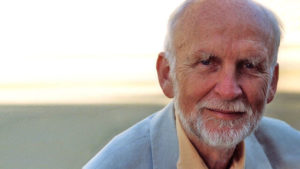Reginald Hill
(EXCERPTS)
For over thirty years, Reginald Hill has been recognised as one of the most versatile, inventive, and prolific crime writers. He is a seasoned author with scores of novels and short stories to his credit, yet he consistently proves with each new novel that, not only is he at the top of his game, he keeps getting better.
Hill is best known for creating the crime-solving team of hard-talking, overbearing Superindent Andy Dalziel and urbane, progressive Detective Inspector Peter Pascoe. Starting in 1970, with the publication of A Clubbable Woman, this odd couple has been featured in nineteen novels—all of which have been successfully adapted for television by the BBC. Hill has also written a series of short stories based on Luton private eye, Joe Sixsmith and he has published several stand-alone novels under his own name and under the name, Patrick Ruell. He is an accomplished exponent of the short form as well, and his canvas is broad with stories like, “The Rio de Janeiro Paper” (1979), “On The Psychiatrist’s Couch” (1997), and “The Game of Dog” (2004), as well as an enjoyable Sherlockian pastiche, “The Italian Sherlock Holmes” (1998).
Throughout his career he has won several awards, including the Crime Writers’ Association Gold Dagger in 1991, for Bones and Silence, and in 1995 the CWA Cartier Diamond Dagger for his outstanding contribution to crime fiction. But for all his range of achievements, few would disagree that much of his best work is to be found in the Dalziel and Pascoe series.
Throughout the series Hill has continued to experiment, and the result is that he has done more than merely avoid staleness and eschew formula—he has provided a marvellous illustration of the potential of the long-running detective series. Each book stands on its own merits, but those who take the trouble to read the novels in chronological sequence are likely to find their pleasure further enhanced as they see the development not only of the characters, but also of this writer’s considerable skills. For ingenuity, wit and insight, he has few peers.
Hill’s latest Dalziel and Pascoe novel, Death Comes for the Fat Man, was released in March by HarperCollins. Reginald Hill lives in Ravenglass, Cumbria, with his wife Pat.
AFG: There’s a lot of buzz about your newest book, Death Comes for the Fat Man. Tell our readers what it’s about.
RH: Yeah, well I suppose there are two ways of looking at it for the old fans of the series. The big question on this side of the water is does death really come for Andy Dalziel? The question is posed ever more dramatically, because the book’s called The Death of Dalziel. But for some reason my American publishers didn’t feel the American market was quite ready for such directness, so they called it Death Comes for the Fat Man, which, of course, is a glance at the famous Willa Cather title Death Comes for the Archbishop. So I mean that’s the fan hook, which I hope will attract readers to see whether Andy really does get pushed over the Reichenbach Falls [laughs]. The other thing that it is about is this growing terrorist threat. I don’t know how it reverberates over there, but over here the government is becoming increasingly concerned, about the terrorist threat with the London bombings and the attempted London bombings. We’ve just got a trial on now for the failed series of bombings which happily didn’t come off last year, and everyone’s very aware that it’s not just something you read about in faraway places—it’s right on our doorstep. So I began thinking about the nature of the possible backlash. You get it, of course, to some extent in poor, innocent Muslim communities which are being targeted by nuts.
AFG: Yeah, the innocent people always end up getting it.
RH: Yes. But I wondered, what if someone within the security services began to target people who weren’t innocent, because they were pretty certain these people were guilty of something—of support or of terrorist activity—but were still beyond the reach of the law, because there wasn’t enough evidence against them. In other words, some kind of vigilante movement within the security service. That’s how the idea started and that’s what the book is about. With, of course, the added interest that Andy Dalziel gets inadvertently caught up in this at the beginning and put into a coma. So will Dalziel survive? And will Pascoe be able to track down the perpetrators of this act? And he soon gets the feeling that someone in his own security service isn’t really playing ball with him.
AFG: So Dalziel goes into a coma at the beginning.
RH: Yes, Dalziel gets put into a coma at the end of the first chapter when, unexpectedly, he gets blown up. And so does Pascoe, but Pascoe survives. There’s not very much hope for Dalziel. But he is still very much a presence in the book, because, as you know, from time to time we go to Dalziel in a kind of stream-of-consciousness way, and you get some notion of where he is—he’s sort of only in that never-never land floating between life and death. He’s got some awareness sometimes about what’s going on around him but as for his reactions, he can’t respond in any way that anyone can see; that is, except by letting out the occasional fart [laughs]. But when he becomes distantly aware that someone is actually praying for him, it really gets up his nose being a deeply anti-religious man. So Dalziel remains a very serious presence in the book, even though throughout it he is well on the verge of death. And as I say, the big question for the old Dalziel and Pascoe fans is, is this the end of Andy Dalziel?
